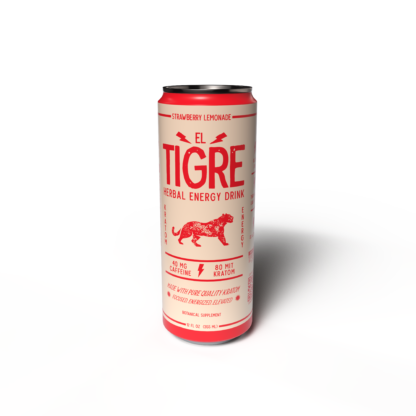Mechanisms of Action
Understanding how substances exert their effects on the body is crucial when exploring their potential benefits and risks. In the realm of appetite control, kratom-containing energy drinks present a fascinating case study.
Kratom and Dopamine

Kratom, derived from the Mitragyna speciosa tree, contains alkaloids that interact with various neurotransmitter systems in the brain, including those involved in regulating appetite. Mitragynine and 7-hydroxymitragynine, two primary alkaloids in kratom, are thought to act as partial agonists at mu-opioid receptors. Activation of these receptors can suppress appetite by modulating the reward pathways in the brain and reducing cravings for food.
Dopamine, a neurotransmitter associated with pleasure and reward, plays a significant role in appetite regulation. Kratom alkaloids may indirectly influence dopamine levels. By binding to opioid receptors, they can modulate the release of dopamine in certain brain regions, potentially contributing to feelings of satiety and reducing food intake.
Kratom and Serotonin
Serotonin, another crucial neurotransmitter involved in appetite control, mood regulation, and satiety, may also be affected by kratom. Research suggests that kratom alkaloids can influence serotonin levels, possibly through their interaction with serotonin receptors or by modulating the activity of enzymes involved in serotonin synthesis or breakdown.
While more research is needed to fully elucidate the complex mechanisms involved, these interactions with neurotransmitter systems like opioid and serotonergic pathways likely contribute to kratom’s potential appetite-suppressant effects.
Potential Benefits for Appetite Control

Kratom energy drinks offer a potential avenue for managing appetite. Derived from the Mitragyna speciosa tree, kratom contains alkaloids that interact with neurotransmitter systems in the brain responsible for regulating food intake.
Increased Satiety
Potential benefits of kratom energy drinks for appetite control stem from the interaction of its alkaloids with neurotransmitter systems involved in satiety and hunger regulation. Mitragynine and 7-hydroxymitragynine, two primary alkaloids in kratom, are thought to act as partial agonists at mu-opioid receptors. Activation of these receptors can suppress appetite by modulating reward pathways and reducing cravings for food.
Kratom’s influence on dopamine, a neurotransmitter associated with pleasure and reward, may also contribute to appetite control. By modulating dopamine release in specific brain regions, kratom may promote feelings of satiety and reduce food intake.
Additionally, kratom’s potential impact on serotonin, a neurotransmitter crucial for appetite regulation, mood, and satiety, adds another layer to its appetite-controlling properties. Kratom alkaloids may influence serotonin levels through interactions with serotonin receptors or by modulating the activity of enzymes involved in serotonin synthesis or breakdown.
Reduced Cravings
Kratom energy drinks present a potential avenue for managing appetite due to their key ingredient: kratom, derived from the Mitragyna speciosa tree. This herb contains alkaloids that interact with neurotransmitter systems in the brain responsible for regulating food intake.
Mitragynine and 7-hydroxymitragynine, two primary alkaloids in kratom, are thought to act as partial agonists at mu-opioid receptors. Activation of these receptors can suppress appetite by modulating reward pathways in the brain and reducing cravings for food.
Kratom may also influence dopamine, a neurotransmitter associated with pleasure and reward, which plays a role in appetite regulation. By modulating dopamine release in certain brain regions, kratom could promote feelings of satiety and reduce food intake.
Furthermore, kratom’s potential impact on serotonin, another crucial neurotransmitter involved in appetite regulation, mood, and satiety, adds another layer to its appetite-controlling properties. Kratom alkaloids may influence serotonin levels through interactions with serotonin receptors or by modulating the activity of enzymes involved in serotonin synthesis or breakdown.
Metabolic Effects
Kratom energy drinks offer a potential avenue for managing appetite. Their key ingredient, kratom derived from the Mitragyna speciosa tree, contains alkaloids that interact with neurotransmitter systems in the brain responsible for regulating food intake.
Two primary alkaloids in kratom, mitragynine and 7-hydroxymitragynine, are thought to act as partial agonists at mu-opioid receptors. Activation of these receptors can suppress appetite by modulating reward pathways and reducing cravings for food.
Dopamine, a neurotransmitter associated with pleasure and reward, also plays a role in appetite regulation. Kratom may influence dopamine levels, potentially promoting feelings of satiety and reducing food intake.
Kratom’s potential impact on serotonin, a neurotransmitter crucial for appetite regulation, mood, and satiety, adds another layer to its appetite-controlling properties. It may influence serotonin levels through interactions with serotonin receptors or by modulating the activity of enzymes involved in serotonin synthesis or breakdown.
Research Evidence
Research provides valuable insights into the mechanisms by which substances exert their effects on the body, including their potential benefits and risks for appetite control. Kratom-containing energy drinks present a compelling case study, as they incorporate kratom, derived from the Mitragyna speciosa tree, known for its interaction with various neurotransmitter systems in the brain.
Animal Studies
Animal studies have provided valuable insights into the potential effects of kratom on appetite regulation. Research has shown that administration of kratom extracts or alkaloids in animal models can lead to a decrease in food intake and body weight gain.
These findings suggest that kratom may possess appetite-suppressing properties. However, it is important to note that animal studies do not always directly translate to human responses, and further research in humans is necessary to confirm these effects and understand the underlying mechanisms involved.
Human Studies (Limited)
Research on the effects of kratom on appetite control in humans is limited. A few small-scale studies have suggested potential benefits, but more robust and well-designed clinical trials are needed to establish a clear understanding of its efficacy and safety for this purpose.
The small number of human studies available makes it difficult to draw definitive conclusions about the effectiveness of kratom for appetite control. Further research is crucial to determine optimal dosages, potential side effects, and long-term implications of using kratom for managing appetite.
Safety and Considerations
While kratom presents a promising avenue for appetite control, it’s crucial to approach its use with caution and consideration. Kratom can interact with various medications and may have adverse effects for individuals with pre-existing health conditions.
Dosage Recommendations
Kratom energy drinks offer a potential avenue for managing appetite but should be approached with caution. Due to limited research on human subjects, dosage recommendations are unclear.
It is essential to consult a healthcare professional before using kratom-containing products, especially if you have pre-existing health conditions or are taking medications. They can provide personalized advice based on your individual circumstances and help determine if kratom energy drinks are an appropriate option for you.
Side Effects

Kratom energy drinks may aid in appetite control due to the alkaloids present in kratom, but potential side effects and safety concerns should be carefully considered. Kratom can interact with various medications and may have adverse effects on individuals with pre-existing health conditions.
Before using kratom-containing products, consulting a healthcare professional is crucial. They can provide personalized advice based on individual circumstances and help determine if kratom energy drinks are an appropriate option.
Interactions with Medications
It’s important to understand that kratom can interact with various medications. These interactions can potentially lead to adverse effects or reduce the effectiveness of both kratom and the medication.
Individuals with pre-existing health conditions, such as liver disease, kidney problems, or substance use disorders, should exercise extreme caution when considering kratom consumption.
Always consult a healthcare professional before using kratom energy drinks, especially if you are taking any medications.
They can help assess potential risks and interactions and advise on whether kratom is safe for you.
Legal Status
Kratom is a substance with varying legal statuses around the world. Some countries have outright banned it, while others have regulated its sale and use. In some places, kratom is sold as a dietary supplement, while in others, it may be classified as a controlled substance.
The legal status of kratom can change frequently, so it’s essential to research the specific laws in your jurisdiction before using it. It’s also important to remember that even where kratom is legal, there may be restrictions on its sale, possession, or consumption.
Kratom energy drinks subscription
Decleor Direct
Ephemera Atelier
- Why Can’t You Get Lip Filler When Pregnant - November 11, 2025
- What Is The Best Age To Use Radiesse? - November 10, 2025
- What Are Dermal Fillers For Ears? - November 8, 2025
